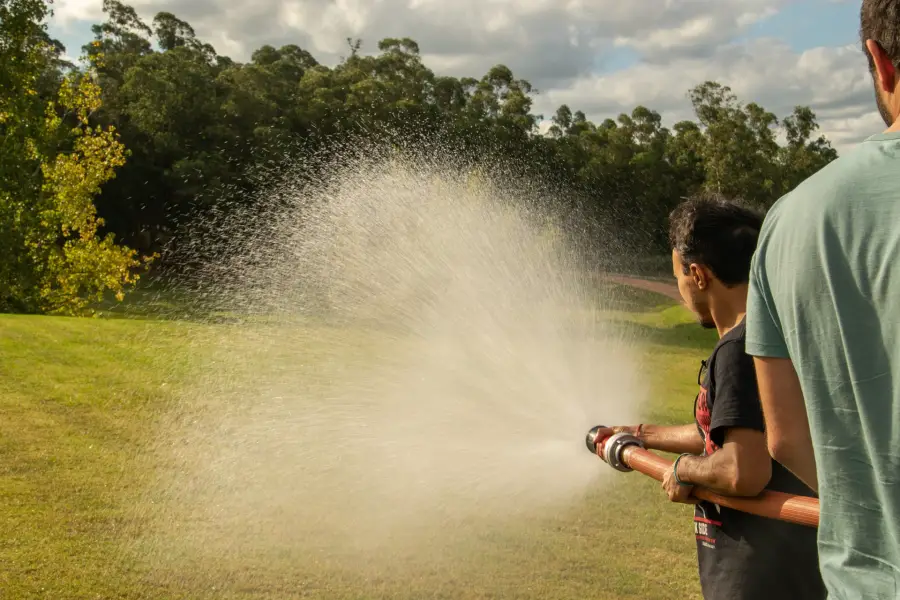Any landscaper knows that managing weeds is an effective part of lawn care. Weed and feed is one of the most common ways of doing this, especially in a crisis but, to get the best results, a few protocols must be observed.
It is recommended to wait 24 hours before mowing after a liquid application of Weed and Feed type product. For granular products, it is best to wait 48 hours to ensure that all of the ingredients in your Weed and Feed have dispersed and won’t be removed by mowing.
Today we discuss directions regarding mowing and watering. More specifically, we’ll be taking a look at when you should water or mow after applying weed and feed. Let’s begin!

Contents
How Long After Weed And Feed Should I Mow?
Before we dive into this question, we need to understand the basics of how weed and feed works.
“Weed and feed” is actually the generic term for lawn chemicals that boost the health of lawn grass while eradicating the weeds that compete with the grass for soil nutrients or water. Several brands such as Scotts, Spectracide, BioAdvanced, and Pennington (Amazon links) all have weed and feed products. Weed and feed may come in liquid or granular form.
Generally, these chemicals consist of herbicides (for the weeds) and fertilizer (for lawn growth) …hence, “weed and feed”.
Lawn Fertilizer In Weed And Feed
The fertilizer is usually some sort of NPK (Nitrogen, Phosphorous, Potassium) blend that is beneficial for the rapid growth of a rich and lush lawn.
The balance of this blend may vary because different products cater to different classes and species of grass. A common differentiation is warm-season grasses and cool-season grasses, as both classes have differing nutritional needs.
The Weed Killer Portion Of Weed And Feed
The herbicides include Mecoprop (MCPP), 2,4-Dichlorophenoxyacetic acid (2,4-D), Dicamba, and more. These herbicides kill the plants in several ways. Some, such as MCPP, cause mutations to a plant’s cells, hindering functions like photosynthesis or even absorption of water. Others may affect respiration, food production, and even water retention.
Most weed and feed products are engineered to deal with common weeds like dandelions as well as dollarweed and most leafy weeds.
When weed and feed is applied to turf (usually via a spreader or sprayer) some of it will land on the leaves of targeted weeds. The leaves will begin absorbing the chemical, which kills them in a top-down fashion.
The rest of the chemical will then be absorbed by the soil. When this happens, the roots of the weeds will take up the chemical. This then kills the plant in a bottom-up fashion.
To see other great articles like this one…
- Will Bleach Kill Grass And Weeds In Your Lawn And Walkways?
- How To Get Rid of Milkweed – 12 Ways Experts Do It
- Will 2 4-D Kill Clover? (Answered)
Mowing And Weed And Feed
So, what does mowing have to do with weed and feed?
Well, a lot actually.
Not only does mowing after weed and feed impact the process, but how you mow before is a major consideration.
Mowing Before
Before applying weed and feed, you should mow your lawn if the grass is overgrown. You must not cut the grass too short as this will lessen the weeds’ competition, so to speak, which will make it easier for them to grow. Most grasses should be kept at about three inches tall.
You must also bag the clippings to prevent mulching weed seed heads back into the soil. Weeds tend to grow and mature rapidly so they can spread. Chances are if your lawn is overgrown, you also have matured weeds that are ready to reproduce.
Mowing After
After applying the weed and feed, you must wait at least 24 hours before mowing again. For a granular product, we recommend waiting 48 hours (at least). Make sure you read the instructions on your particular product as some manufacturers may have specific directions for this. However, as a general rule, you should wait at least a day.
Waiting will give weed leaves time to absorb the herbicides. Cutting prematurely may prevent the spread of the chemicals and, ultimately, the death of the weeds.
Mowing too soon also risks wasting the product, especially if it is in granular form. The weed and feed may be redistributed unevenly, which will lead to undesired results. In some cases, your mower could even fling granules into nearby vegetable or flowerbeds, which could kill plants you don’t want to kill.
Don’t Bag
When you do mow your lawn, you must NOT bag. Doing so will waste any granules that have not been absorbed. What you want to do instead is mulch the cuttings back into the soil. This will ensure that as much product remains on the turf as possible. Mulching your lawn clippings will also boost the “feed” side of your product.
For the best results, we recommend that you mulch your clippings for 2-3 mows following the application of weed and feed.
How Long After Weed And Feed Should I Water?
Moisture is also an important part of the weed and feed equation.
Water plays a few crucial roles in the success (or failure) of the application.
After applying weed and feed to your lawn, wait at least 24 hours before watering the grass to ensure all of your time and money investment isn’t simply washed off of your turf. Though the soil should be slightly moist before application, watering too soon could wash away the product.
Much like with mowing, water can be a factor before and after weed and feed is applied.
Watering Before
Before applying weed and feed (especially the granular varieties), the soil must be moist. The best time to apply the chemical is after watering or rain.
As you already know, water serves as a vehicle for the uptake of soil nutrients (or, in this case, deadly herbicides). Roots cannot take up dry granules. If you are in a particularly dry area, you should water the turf the day (or evening) before applying weed and feed.
While we’ve discussed leaf absorption, we must remember that this is not the primary way of delivering chemicals to plants. Not only that, but some weeds do not have leaves that are broad or strong enough to catch and hold weed and feed granules. Therefore, root uptake is essential.
Moist soil will also speed up your grass’ uptake of the fertilizer. Additionally, applying granules to moist soil will prevent them from being blown away by the wind.
Watering After
After applying weed and feed, you should also wait 24 hours before watering. Again, consult the instructions on your product as the wait time may be longer or shorter. You must also check out weather forecasts to avoid applying the chemical on a rainy day. If forecasts predict rain within 24 hours, do not apply weed and feed.
Premature watering or rain could wash away the weed and feed from the leaves, hindering leaf absorption. Excessive water may even hinder root uptake if the chemical is washed away by erosion. Either way, the product will be wasted and you won’t get the desired results.
The Final Touches On Watering And Mowing With Weed And Feed…
Again, it depends on the type of application to be sure when it is safe to mow after a weed and feed. For granular versions, it is best to wait 48 hours. For liquid weed and feed, as long as it is completely dry it should be fine to mow. This could take a few hours on a hot day or up to 24 hours other times.
It is best to wait a minimum of 24 hours before mowing or watering after a weed and feed application. Any shorter amount of time and you could risk losing the beneficial effects of the product all together.
Here are some other great articles you will enjoy…
- Mixing Tips For Lesco Prosecutor Herbicide And What It Is
- Glystar Plus Mix Ratio (Explained)
- How To Identify Wide Blade Grass And What To Do About It
References
